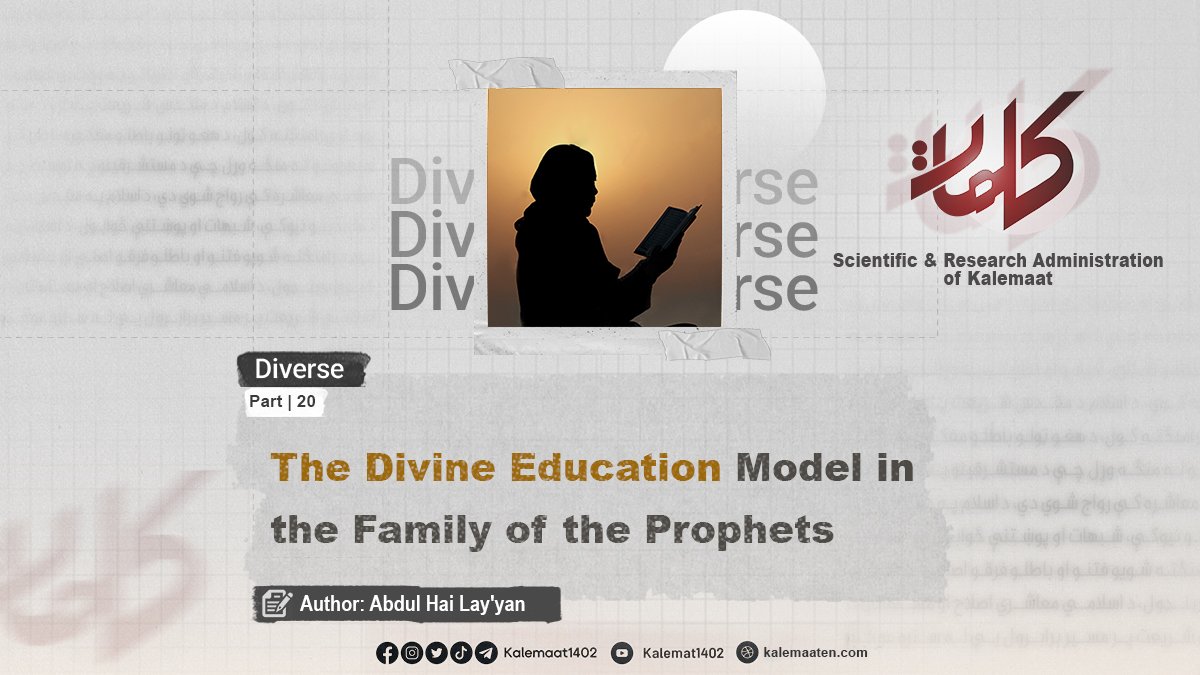Author: Abdul Hai Lay'yan
The Divine Education Model in the Family of the Prophets (Part 20)
Ninth Teaching: Envy, the Disease Behind the First Murder on Earth
The heart of Cain became filled with the disease of envy because Allah, the Exalted, accepted his brother Abel’s sacrifice while rejecting his (Cain’s) offering, which led him to commit this great crime. This indicates that envy is an ancient disease in humanity, and suppressing or eradicating it from the soul is only possible through deep faith, knowledge, insight, and purification of the self. Since this disease poses serious dangers to both the spirit and society, we will elaborate on it further:
1. Definition of Envy:
Envy is the desire for the removal of blessings from others. This is in contrast to ghibṭah (appreciative envy), which is the desire to possess something similar to what others have, without wishing the removal of their blessings.
2. Harms of Envy:
Envy causes serious harm both to the envious person and to the one envied.
A. Harms of Envy on the Envious:
The damage envy causes to its possessor comes from several aspects, including:
•Envy makes its owner arrogant toward others and reject the truth. This is why, when Satan envied Adam (peace be upon him), his envy led him to disobey Allah’s command and refuse to prostrate to Adam. The Qur’an recounts: “قَالَ أَنَا خَيْرٌ مِّنْهُ خَلَقْتَنِي مِن نَّارٍ وَخَلَقْتَهُ مِن طِينٍ” Translation: “He said: I am better than him; You created me from fire and him from clay.”
Therefore, Allah expelled him from Paradise, saying: “قَالَ اخْرُجْ مِنْهَا مَذْؤُوماً مَّدْحُوراً لَّمَن تَبِعَكَ مِنْهُمْ لأَمْلأنَّ جَهَنَّمَ مِنكُمْ أَجْمَعِينَ” Translation: “(Allah) said: ‘Get out of it, disgraced, rejected; and whoever follows you among them—I will surely fill Hell with you all.’”
•Envy brings sorrow and grief to the heart of the envious due to the blessings Allah has given to others. This sorrow persists as long as those blessings remain; if the blessings disappear from their owners, the sorrow in the envious person also disappears and is replaced by joy and delight. Regarding this, Allah says: “If good befalls you, it grieves them; and if evil befalls you, they rejoice.”
•Envy drives its possessor to rebellion and opposition to the command of Allah, the Exalted. The envious person, in their envy, acts as one who is angry with Allah’s decree and questions Allah for bestowing blessings upon others. This is highly dangerous, as it affects a person’s faith and may harm it, leading to adverse consequences in this world and the Hereafter. We seek refuge in Allah from this.
B. Harm of Envy on the Envied:
Envy also harms the person who is envied (maḥsūd), whether the envious manifests it through words or actions, or keeps it hidden. Allah, the Exalted, says: “قُلْ أَعُوذُ بِرَبِّ الْفَلَقِ * مِن شَرِّ مَا خَلَقَ * وَمِن شَرِّ غَاسِقٍ إِذَا وَقَبَ * وَمِن شَرِّ النَّفَّاثَاتِ فِي الْعُقَدِ * وَمِن شَرِّ حَاسِدٍ إِذَا حَسَدَ” Translation: “Say: I seek refuge in the Lord of the daybreak, from the evil of what He created, from the evil of the darkness when it settles, from the evil of those who blow on knots (practicing witchcraft and causing corruption), and from the evil of the envier when he envies.”
In this verse, seeking refuge in Allah is not limited to acts stemming from envy.
Moreover, only the Creator of the human soul, Allah, can truly know its depths, subtleties, characteristics, powers, and effects. Therefore, envy is inherently harmful, and for this reason, one must seek refuge in Allah from it.
Shahid Sayyid Qutb (may Allah have mercy on him), in his commentary on the verse “وَمِن شَرِّ حَاسِدٍ إِذَا حَسَدَ”, states: Envy is an inner reaction to the blessings Allah has bestowed on some of His servants, accompanied by a desire for the removal of those blessings. Whether the envious acts to destroy the blessings out of hatred and anger or merely experiences a psychological reaction, harm may result from this inner reaction. If the envious directs this psychological reaction toward the person envied, its influence cannot be denied simply because our scientific knowledge and testing tools cannot uncover its secrets. We know only a little about it, often accidentally revealed, and this small knowledge becomes established as truth. Therefore, harm exists here that must be sought refuge from Allah, and Allah, by His mercy and grace, guides His Messenger (peace be upon him) and his Ummah to seek refuge in Him from such evils. Certainly, when they seek His protection, Allah will safeguard them from these harms, both general and specific.
Continues…
Previous Part/ Next Part
[1]. P/76.
[2]. Al-Araf/18.
[3]. Al-Falaq/1-5.
[4]. Al-Falaq/1-5.
[5]. Mohammad, Seyyed Qutb, Faizilal Al-Qur’an, vol. 6, p. 4008.



